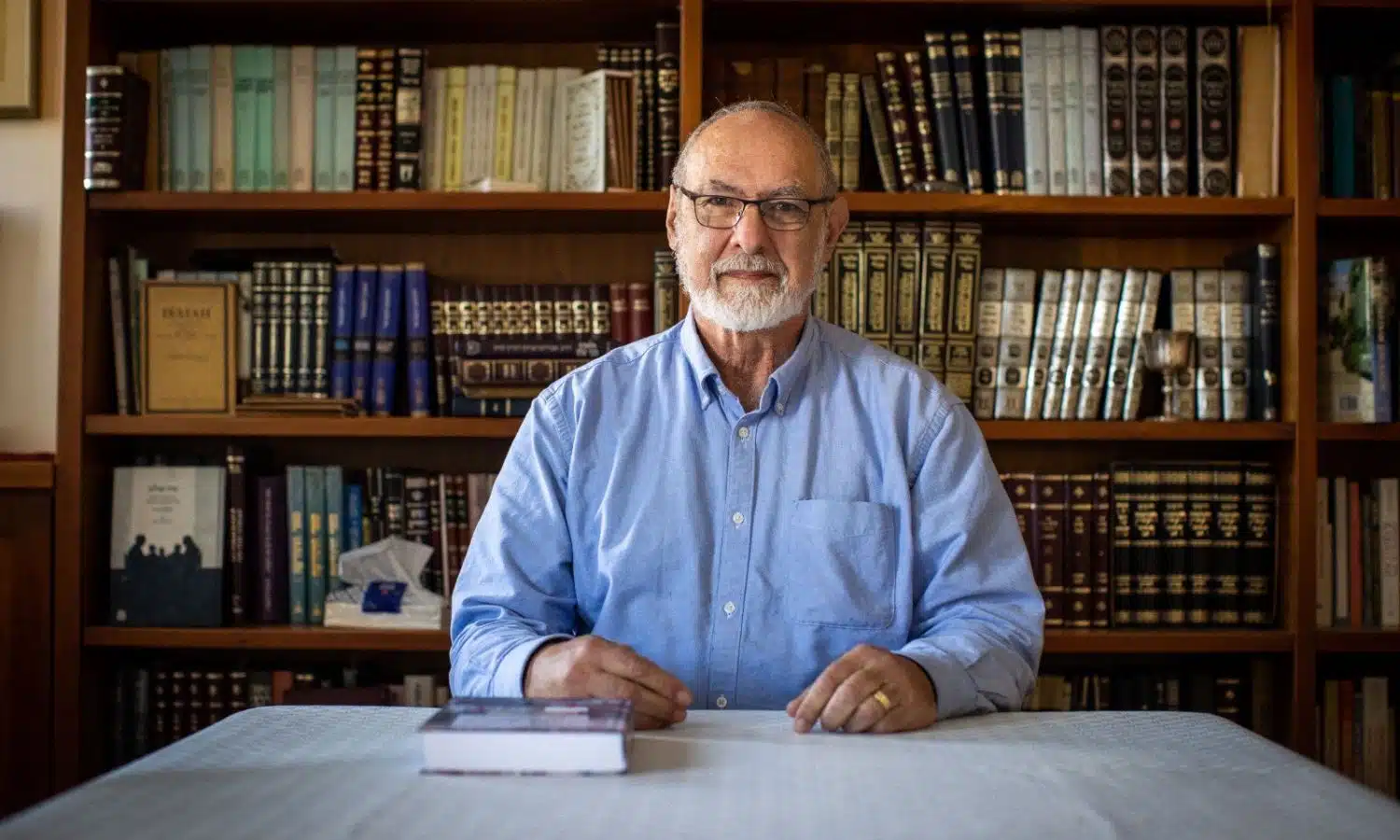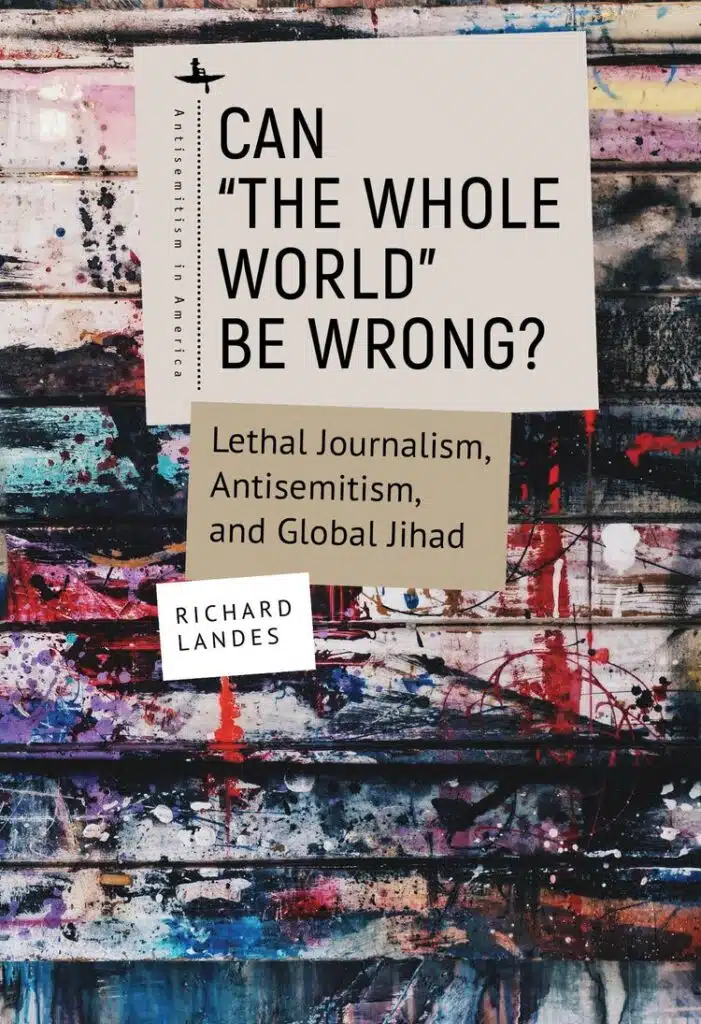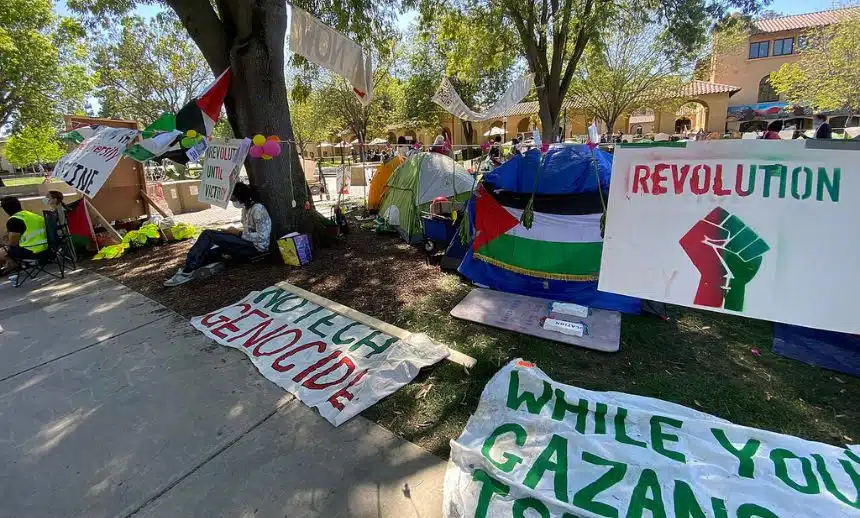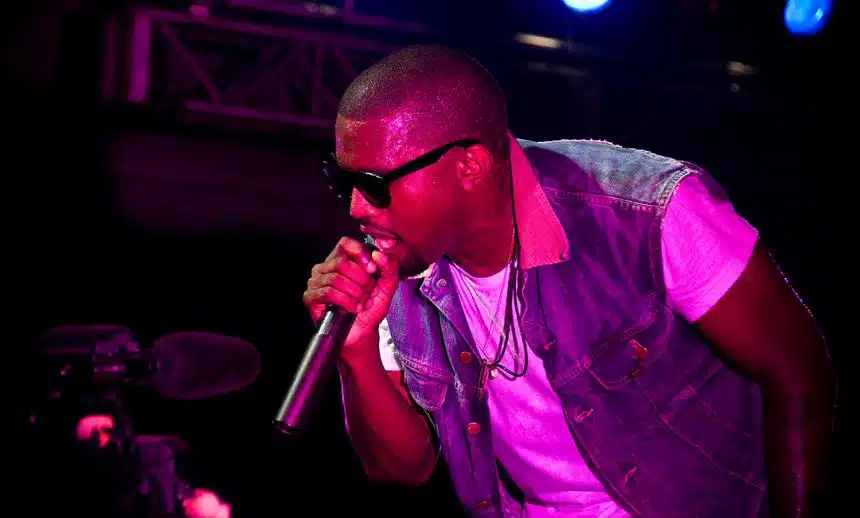|
Getting your Trinity Audio player ready...
|
In his latest book, Can “The Whole World” Be Wrong?: Lethal Journalism, Antisemitism, and Global Jihad, Professor Richard Landes, a trained medievalist and historian of apocalyptic movements, offers insights on the political and media dynamics that drove the West’s responses to the Islamist terror campaigns it faced at the start of the 21st century and their ongoing impact on world affairs two decades later.
In an interview from his home in Jerusalem this week, Landes spoke with Combat Antisemitism Movement (CAM) Editor-in-Chief Barney Breen-Portnoy in-depth about the influence of the age-old hatred of Jews on coverage of Israel and broader events in the Middle East and beyond, as well as the “astonishing stupidities” that are undermining democratic societies today.
What specific role does antisemitism, and anti-Zionist manifestations of antisemitism in particular, play in the journalistic malpractice we see so much of when it comes to coverage of Israel-related events?
I think there are two dimensions to this. The first is the attitudes of the reporters and editors, and the second, of their targeted audiences. Among journalists there was, ca. 2000, a reasonably wide range of attitudes and reporting from journalists based here. Even those who admitted holding Israel to a higher standard didn’t invert it, although most of the pro-Israel reporting came from journalists who were big supporters of the peace process, and therefore, alas, hostile to anyone who suggested that the Palestinians, and especially their leader Yasser Arafat, were untrustworthy — in this sense, they reflected a broad range of liberals and progressives who were so committed to the peace process that they treated doubters as right-wing war mongers with “Holocaust paranoia.” One could still, however, argue that many reporters held to their commitment to be “honest witnesses to the events of their times.”
But after 2000, the year that marked the first of many of Global Jihad’s assaults on Western democracies, we find a pack journalism led by what I call “lethal journalists,” who reported Palestinian war propaganda as news (the Muhammad al-Durrah “murder,” Jenin “massacre,” etc.), and the rest of the journalists, deeply intimidated by Palestinian threats, acquiesced to this new narrative which not only held Israel to the highest standards, but exculpated the Palestinians. Journalists who disliked Israel found the new environment — replete with NGOs, UN workers, and foreign diplomats — highly attractive, upping the open animosity among the pool of reporters significantly.
The pattern that emerged over the next two decades, and counting, has been: first, report Palestinian claims as news; second, dismiss Israeli denials as government propaganda; third, when proven wrong, repeatedly, fall silent or mumble a correction; and fourth, move on to the next lethal narrative targeting Israel — the 2014 shelling of the Shati refugee camp that killed 14, with Israel initially reported to be to responsible, when in reality Hamas was to blame). The result is a journalistic narrative that, over the last two decades, is 80-95% compliant with the Palestinian narrative.
The second dimension concerns the audience for this kind of lethal journalism. Especially among the “progressives,” one finds an almost insatiable appetite for stories of Israelis and Jews behaving badly, amplified and broadcast by the Israel-obsessed “human rights” NGOs like HRW and Amnesty International. French journalist Catherine Nay responded to the staged al-Durrah footage by declaring, “This picture erases, replaces the picture of the boy in the Warsaw ghetto.”
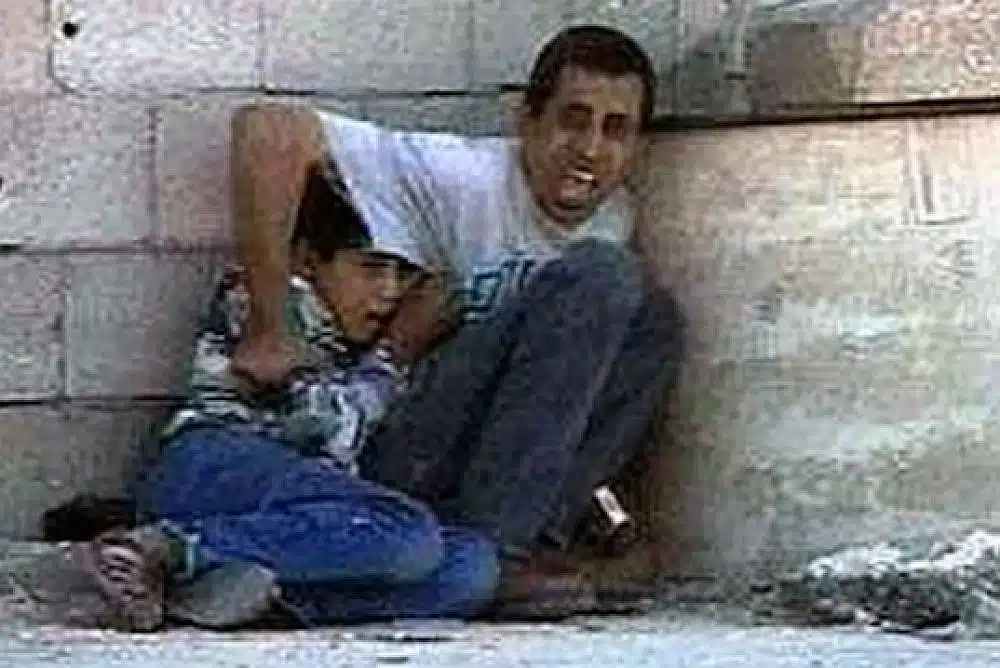
That response, shared by many bien-pensants in Europe (including Jews), embodies the way lethal journalism induces moral and empirical disorientation, and enables Holocaust inversion: Palestinians = Jewish victims; Israelis = Nazi genociders. In response to strong objections that this was Jew-hatred, politicians like Jeremy Corbyn and Ken Livingstone and intellectuals like Judith Butler and Tony Judt (both Jews, by the way) dismissed these complaints as attempts to silence any criticism of Israel (still a powerful meme). Flipping the formula, these same figures treated any criticism of Islam as “Islamophobia,” which they abhorred as the new and repugnant racism of the 21st century.
There developed over the first years of the 21st century a strong circle of mutually enforcing anti-Israel discourse between journalists, NGOs, the UN, and an active progressive and Islamist audience ready to hit the streets every time Israel and its neighbors fought and the lethal journalism of Palestinian suffering hit the headlines, including spikes in attacks on Diaspora Jews. That largely progressive discourse overlapped extensively with antisemitic tropes (i.e. accusations of genocide, Nazi behavior, apartheid racism, targeting Palestinian children, deliberately maiming, and organ theft), even as these critics ignored all the evidence that Palestinians targeted children, preached genocide, and admired the Nazis.
Is this antisemitism? Or peer-driven bullying? I suppose each case deserves its own consideration, and I personally prefer to save “antisemitism” for exterminationist Jew-hatred (Nazis, jihadis). But I’d venture to say, you have to have a significant hostility to Jews (resentment, fear, anxiety), especially to free Jews, to make these colossal errors of moral judgment, all the more, when these pitiless judgments hurt you at least as much as those you judge.
Is the general media hostility toward and unfair treatment of Israel a unique phenomenon in the world, and if so, how do you explain it?
I think there are other cases of lethal journalism (reporting one side’s war propaganda as news), but nothing like the sustained and obsessive coverage of Israel. First of all, Israel is news on a scale like no other country. The size of the pool of journalists here and the coverage is, per capita, by far greater than any country in the world (including the U.S,). The reason for that is, I think, the moral dimension: Jews, since biblical times, have claimed to be a moral example to the world, and therefore this conflict constitutes a morality play like few others.
Consistently, legacy media like CNN and the BBC focus on Palestinian children victims of Israeli strikes but look away from jihadis firing from the midst of their civilians, even when they thereby kill their own children. On the other hand, whenever these news outlets have a chance to accuse Israel of targeting non-combatants, they lavish attention on the case (i.e. Shireen Abu Akleh). Today, in circles of people who think they’re on the right side of history, it’s a doxa that Israelis target Palestinian children, when the exact opposite is tragically, but unavowedly, true.
There I think there are four explanations for this extraordinary journalistic distortion, each of differing strength and reach.
- Intimidation: For all of the reporters, no matter how they aspire to their professional values, it’s a way to avoid retaliation by Palestinian jihadis, who will not hesitate to punish violations of their published protocols on reporting. Thus, for example, journalists won’t call them terrorists because the men and women targeting Israeli civilians don’t want to be so designated, and because, as the terrorists they actually are, they will hit back those who “hurt their feelings.” No reporter who calls Hamas “terrorists” or reports on Palestinian rockets killing Palestinian children, stays long in Gaza.
- Jew-baiting: For some journalists, however, the demonization of Israel is a passionate sport. Report every possible case of Israeli misdeeds as a way to knock Israel off its moral “high ground,” and downplay Palestinian war and speech crimes because that would take Israel off the moral hot seat. Some of this clearly stems from a deep dislike of (and anxiety about) free Jews. Others may just be the thrill one gets by joining the crowd in bullying an agreed-upon victim.
- Post-colonial paradigm: For some it’s a reflection of their commitment to the post-colonial, Saidian paradigm in which the Palestinians are the colored, indigenous victims and the Israelis the white, imperial colonialists. This ideological commitment, which many reporters embrace openly and many a scholar dedicate themselves to documenting, may also serve as a fig leaf for their cowardice in submitting to Palestinian intimidation and their animosity to Jews, even as they deny both.
- Audience schadenfreude: For some it’s what their editors want, on the one hand to protect their reporters in the field (from Palestinian retaliation), on the other, to feed the moral appetite of the readership for stories of Jews behaving badly, and to appease the demands of their increasingly radicalized and cancel-culture empowered employees.
Hence, in the case of reporting about Israel, you have a unique, perfect storm of factors that guarantee sustained distorted reporting on a scale that dwarfs any other modern conflict.
What motivated you to write this book and why did you choose the specific time frame of the first several years of the 21st century?
Already in the 1990s, a graduate student named David Cook (now a professor at Rice University) alerted me to the apocalyptic dimensions of Global Jihad, and I recognized there all the aspects of medieval Jew (and “heretic”) hatred: hardwired zero-sum thinking, vengeance-driven scapegoating, and dualistic narratives of a merciless final battle between good (us) and evil (them). As a student of apocalyptic dynamics, I recognized the most dangerous form of the belief: a massive destruction of evil must take place before the arrival of the reign of the just (the Kingdom of the Saints, the Global Caliphate), and we believers are the agent of that global redemption. In the hands of Crusaders, the Taiping, the Soviets, Maoists, and Khmer Rouge, it had led to death in the millions and tens of millions. Since in these jihadi narratives the West was “them” (the bad guys), and the jihadis “us” (the good guys), it was pretty clear where those with a commitment to a positive-sum, self-critical, tolerant civil society should stand.
In 2000, however, the “progressive left” took a sharp swing toward an alliance with Global Jihad, at whose heart lay this obsessive-compulsive hatred of Israel. The Durban UN Conference in 2001 consecrated this unholy marriage of pre-modern sadism (“You Westerners are to blame for all the evil in the world”) and post-modern masochism (You’re right, how can we atone?). Without realizing the implications for their own dreams of social justice, the progressive left at Durban adopted the apocalyptic narrative of the jihadis: Israel and the U.S. were the Dajjal, the Antichrist, or, in secular terms, the Nazis.
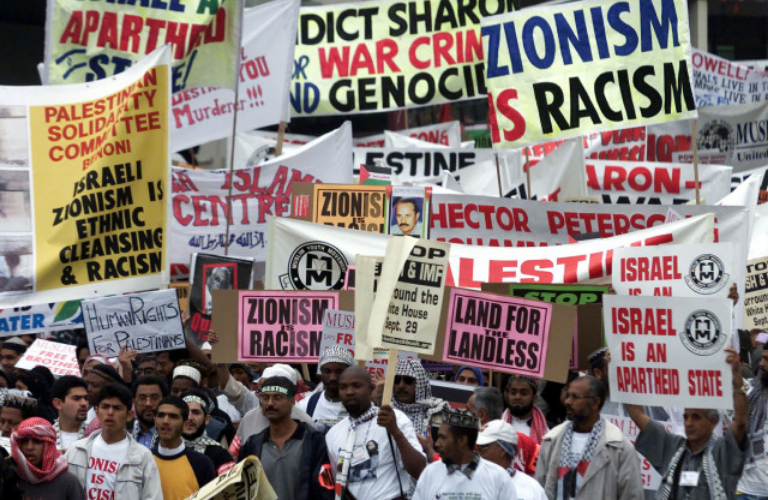
This move locked into place a suicidal position taken up with various levels of enthusiasm by many of the major opinion leaders in the West. In 2008, I supervised a thesis by Stuart Green on cognitive warfare, and I realized that starting in 2000, the West had been constantly losing a cognitive war against enemies who demanded they stand down before their invasion. I was faced with what, at least before 2000, was an unthinkable development. And yet, by 2003, at the height of the Palestinian terror war on Israel inside and outside the Green Line, “support for the Palestinian cause had become the litmus test of liberal credentials” (Ian Buruma, New York Times). Radical left, maybe, but “liberals”?
When huge anti-war protests hit in 2003 against the proposed war in Iraq, the organizers congratulated themselves on inviting belligerent Caliphators to join Western peaceniks, who scarcely protested posters of Saddam Hussein and Yasser Arafat and the demonization of Israel and the U.S. at a “peace” rally,

In their enthusiasm at the millions demonstrating, leaders like Patrick Tyler and Jonathan Schell saw their movement as a new force contesting the U.S, as sole global hegemon. But on the civic front, it was the collapse of the cultural Maginot Line.
In the book, I speak of “Y2KMind,” because in 2000, for the first time, jihadis had attacked a democracy, and the response was to blame the democracy, Israel. So when, just after the Durban hate fest, the second attack struck on 9/11, against the other apocalyptic enemy, the USA, that instinct to blame the democracy became the strong horse.
It’s not that these Western attitudes, what Roger Scruton calls “oikophobia” (hatred of one’s own culture), did not exist before. But, aside from academia, they were still marginal. Faced in that critical year 2000 with a stark choice between one’s own faulty culture and one that expressed the darkest aspects of pre-modern authoritarian culture (misogyny, homophobia, intolerance, holy war, and violent hatreds), a critical mass of the information elite — journalists, academics, human rights NGOs, publishers, educators pundits, and influencers — chose to side, knowingly or not, with the holy warriors trying to wipe out their own culture.
How many were true believers? How many terrified of being accused of “Islamophobia”? Too many in both cases. Ironically, then, the first massive Caliphator victory of the 21st century in its invasion of the West came by appealing to the West’s formally denied antisemitism. Y2KMind’s first “blame-the-democracy” narrative was about the Jewish state, and it became the litmus test.
So I wrote the book by focusing on the events in 2000 and in the immediately subsequent years because I wanted to tell my readers — all of them: Jews, “infidels,” and moderate Muslims alike — how the current catastrophic dysfunctions of democracy got launched, and how the current addiction to moral schadenfreude about the Jews introduces toxic levels of misinformation into the public sphere. And that when the same information systems cannot, will not, register the jihadi voices, with their delirious paranoias and raging genocidal hatreds, this self-induced folly was a form of cultural suicide.
Have there been any major shifts in the dynamics you analyze in the book in the past two decades?
To some extent Israelis and Jews have awakened to the threat and are fighting back in a way that did not happen at all in 2000, and even the Israelis, although fitfully, recognize the importance of this cognitive war. In 2000 it was hard to imagine the scale of failure in the information professions that was taking place. It still is.
But at the same time, the emergence of social media has given the anti-Zionists, including Jewish ones, a great deal of traction. If anything, the pleasure some progressives take in heaping degrading narratives on Israel, with all the fear and hatred of Jews that inspires, has metastasized since 2000. It comes now from many directions — left, right, Blacks, Jews, Arabs. And the Jewish spokespeople fighting antisemitism find themselves paralyzed by the heavy pressure not say anything that might be seen as “Islamophobic.”
So it becomes harder and harder to speak out and get heard. The anti-Zionist doxa is so deeply embedded in the West that one French reader of my book told me, “A translation couldn’t be published here. It’s too heretical.” It was quite hard to find a publisher even in the U.S. (thank you Eunice Pollack and Academic Studies Press). Mainstream publishers are very protective of their bona fides and fear the stigma of something that will invoke cries of “Islamophobia.”
Overall, I’d say we’re in a much worse position today than in 2000 when we started squandering all our cultural capital in an effort to appease an angry and inflamed global Muslim community (the Danish cartoon scandal in 2005-2006, for example). In this sense, Israel was Target/Patient Zero in 2000, and the betrayal of the journalists covering us with their pack, false witness, has now metastasized to many areas of reporting, both domestic and international. Dissembling for the cause is widely practice. As a result, the spread of fake news has eroded public trust in Western media disastrously. Similarly, the abuse of the notion of phobia has also metastasized, creating a hypersensitive cancel culture with a great deal of power.
In many democracies, this misuse and mistrust has reached unmanageable proportions. When anyone can dismiss counter evidence as fake news, then conspiracy theories proliferate. The U.S. and Israel appear to be riven in two, each side informed by its partisans, each convinced that they are unquestionably right, each ready to see matters in apocalyptic terms if the other side wins the next election. And the rest of the democracies are not far behind. It is no accident that the most advanced crises, the U.S. and Israel, are also the targets of this invasive strategy.
What is the main takeaway that you hope remains in readers’ minds after they finish the book?
In my delusional fantasies, I address this book to the “left” — liberals, progressives, even revolutionaries dedicated to societies of dignity, plenty, and generosity. I even have a brief discussion in the introduction. My message is: your movement has been corrupted by its adoption of the Palestinian narrative. And this “error” has not only hurt its obvious target, Israel, but all democracies, indeed all “infidel” states.
In no small part due to this error, the fate of Western democracies — that is societies that make progressive values and dreams possible — hangs in the balance. Our recovery depends on our ability to wean ourselves of these patterns of thought and emotion. The West may think our democracies are immortal and can continually “sacrifice for peace” — open borders, embrace of the hostile “other,” look away from atrocious behavior — without asking any reciprocity from those to whom we make these concessions. But our Caliphator enemies see us as weak and welcome every manifestation of that weakness, including the dismissal with which so many greet any warnings.
Ironically, we’re in a cognitive war that we could win without violence against a violent foe. But we’ve done exactly the opposite — repeatedly giving advantage to our foes on the very battlefield — discourse — that democracy had built as a rampart to keep out violent fanaticism. Indeed, some of us tell ourselves, we have no real enemies, only potential friends.
In the book, I define “astonishing stupidity” as making advantages for those who want to harm you, and the book is a litany of these “astonishing stupidities.” If you want to understand some of the more troubling tendencies of the progressive left today as well as the increasingly erratic “conservative” right, then understanding what happened in 2000 on the Caliphator-front, can both enlighten you on the dynamics involved, and serve as a moral litmus test.
Those adhering to the “liberal litmus test” of siding with the Palestinian “victims” and opposing the Israeli “racist imperialists” are themselves, willy-nilly, victims of lethal war propaganda that inverts reality. Wherever progressives, those who think they are doing good for humanity, encounter this narrative, they should understand that they are not dealing with some random opinion. The cognitive and moral disorientation this narrative induces corrupts the very values they think they want to promote. And if, when one places some of the blame on the Palestinian leadership, the carrier of this narrative shouts “racism” and “Islamophobia,” know one confronts the very malevolence these advocates attribute to Israel.
To clear out the moral “Augean Stables” of misinformation and disorientation to which our democracies have fallen prey, and to begin to heal our torn social fabric, start with regaining a moral compass on the issues of Israel and her neighbors. Otherwise, you remain a pawn in the apocalyptic cognitive war strategy of your unacknowledged foes and your best institutions — academia, the UN, ICC, NGOs — are profoundly corrupted.
For more information on Can “The Whole World” Be Wrong?: Lethal Journalism, Antisemitism, and Global Jihad, including purchase options, please visit Academic Studies Press or Amazon.

